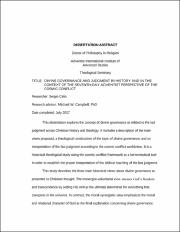| dc.contributor.author | Celis, Sergio | |
| dc.date.accessioned | 2021-07-26T07:16:24Z | |
| dc.date.available | 2021-07-26T07:16:24Z | |
| dc.date.issued | 2017-07 | |
| dc.identifier.uri | https://dspace.aiias.edu/xmlui/handle/20.500.12977/446 | |
| dc.description | Unpublished Dissertation (PhD Religion)
Shelf Location: BT135 .C45 2017 ATDC | en_US |
| dc.description.abstract | This dissertation explores the concept of divine governance as related to the last
judgment across Christian history and theology. It includes a description of the main
views proposed, a theological construction of the topic of divine governance, and an
interpretation of the last judgment according to the cosmic conflict worldview. It is a
historical-theological study using the cosmic conflict framework as a hermeneutical tool
in order to establish the proper interpretation of the biblical teaching of the last judgment.
This study describes the three main historical views about divine governance as
presented in Christian thought. The monergist-voluntarist view stresses God’s freedom
and transcendence by setting His will as the ultimate determiner for everything that
transpires in the universe. In contrast, the moral-synergistic view emphasizes the moral
and relational character of God as the final explanation concerning divine governance.
Interestingly, both views consider the judgment as only a revelation of God’s will, which
was determined or foreknown by Him from eternity. Finally, the natural-humanistic view
gives preponderance to the laws of nature and human decisions to explain what happens
in the world. There is no room for a last judgment from this perspective.
Seventh-day Adventists developed an understanding of the cosmic conflict
worldview using a historical-literal interpretation of Scripture. Biblical motifs about
divine governance include the kingdom of God, covenant, and heavenly council. Divine
governance is Trinitarian and therefore, relational. God governs from the heavenly
sanctuary according to His law of love, a reflection of His character, which provides a
moral basis for His decisions. His governance is also synergistic. Creatures are free to act
either according to or against God’s will. They can participate and collaborate in the
decisions and activities of God’s government. His purpose is to act in a concerted action
with His creatures.
The Bible contains ample evidences for a judgment at the end of the time.
According to the cosmic conflict worldview, this judgment not only decides the final
destiny of all creatures but also vindicates God’s character and the decisions of His
government. The judgment is moral and synergistic in nature because the moral law of
God is the basis for all decisions and includes creatures who actively participate in this
process. God postpones the final decision about the destiny of people until the end of the
time with the purpose of taking these decisions together with His creatures. The judgment
is a real, historical verdict resulting from a process of investigation done between both
God and His creatures. | en_US |
| dc.language.iso | en_US | en_US |
| dc.publisher | Adventist International Institute of Advanced Studies | en_US |
| dc.subject | Seventh-day Adventists -- Doctrines. | en_US |
| dc.subject | Theodicy -- Study and teaching. | en_US |
| dc.subject | Providence and government of God. | en_US |
| dc.title | Divine governance and judgment in history and in the context of the Seventh-day Adventist perspective of the cosmic conflict | en_US |
| dc.type | Dissertation | en_US |

